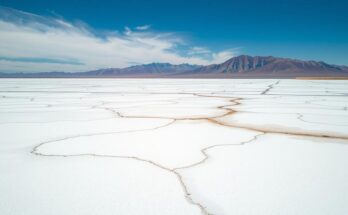The United Arab Emirates has transformed dramatically over the past 40 years, evolving from a country with minimal infrastructure to a high-end destination featuring luxurious amenities. The federation is led by its seven monarchs, with Abu Dhabi as the political heart and Dubai representing economic vibrancy. Educational advancements and women’s empowerment are significant trends, yet the nation remains vigilant regarding regional geopolitical tensions, particularly concerning Iran’s nuclear ambitions.
A visit to the United Arab Emirates today reveals a remarkable transformation from its modest past, where scarce roads and electricity defined the landscape, and camels were the primary mode of transport. Presently, the UAE boasts advanced superhighways, luxurious malls with indoor ski slopes, and an abundance of luxury vehicles. This nation, situated along the Persian Gulf, is synonymous with affluence and sophistication.
The heart of the UAE features the Burj Al Arab, an iconic glass structure and the tallest hotel globally, where celebrities like Tiger Woods and Roger Federer have celebrated remarkable feats. The UAE is a Muslim federation ruled by seven monarchs, balancing their immense wealth with social responsibility among their emirates. Abu Dhabi, the wealthiest emirate controlling significant oil reserves, also serves as the national capital, embodying governance and providing resources for its neighbors.
Dubai, often compared to New York City, is a vibrant counterpart that thrives on tourism and international business. Emirati citizens benefit from numerous state-sponsored services, including healthcare and education, while being exempt from taxes. This economic model has evolved since oil was discovered in 1958 and the nation gained independence in 1971.
The rulers of the UAE form the Federal Supreme Council, which oversees legislative and executive functions. The President of the UAE is the ruler of Abu Dhabi, and the Prime Minister is the ruler of Dubai, with leadership positions allocated every five years among the emirs. A Federal National Council has been established to facilitate an advisory parliament experience, comprising appointed and indirectly elected members.
Women hold a significant position in this evolving culture; notably, Najla Al Awadhi, Deputy General Manager of Dubai’s Channel One TV, emphasizes that stereotypes regarding Muslim women are misleading. She advocates for deeper understanding and education regarding their roles and challenges while acknowledging gradual societal changes, including the decreasing prevalence of polygamy.
Education is a prime focus, with a growing percentage of Emirati students attending universitiy—often outperforming their male counterparts. The UAE has formed partnerships with prestigious foreign institutions to enhance local educational opportunities, further indicating its aspiration for global prominence. Affected by post-9/11 dynamics, many students are now opting for local universities rather than traveling to the United States, altering traditional educational trends.
The volatile geopolitical landscape presents challenges for the UAE, particularly regarding its relationship with Iran. As the nation seeks stability, it engages in dialogue about regional cooperation and a shared rail infrastructure project to circumvent potential threats. The complex dynamics surrounding Iran’s ambitions continue to concern UAE officials as they prioritize diplomatic measures over military confrontations.
Officials express the need for a reassessment of U.S. foreign policy in the region, highlighting the importance of involving regional powers in the diplomatic dialogue regarding Iran’s nuclear capabilities. Diplomatic measures are urged to prevent further military conflicts that could wreak havoc on local economies and stability, with a consensus for regional countries to assume greater roles in establishing peace. Overall, the UAE’s narratives highlight a progressive train of thought, focusing on cultural evolution, educational advancement, and geopolitical awareness.
The United Arab Emirates showcases significant growth and development, transitioning from a modest past to a global hub of luxury and sophistication. The current socio-political landscape highlights the balance between governance, wealth distribution, and evolving cultural norms. Regional cooperation and stability are paramount as the UAE navigates complex geopolitical challenges, maintaining its position as a formidable ally in international relations while advocating for gradual and inclusive advancements in governance and society.
Original Source: www.newjerseyhills.com




